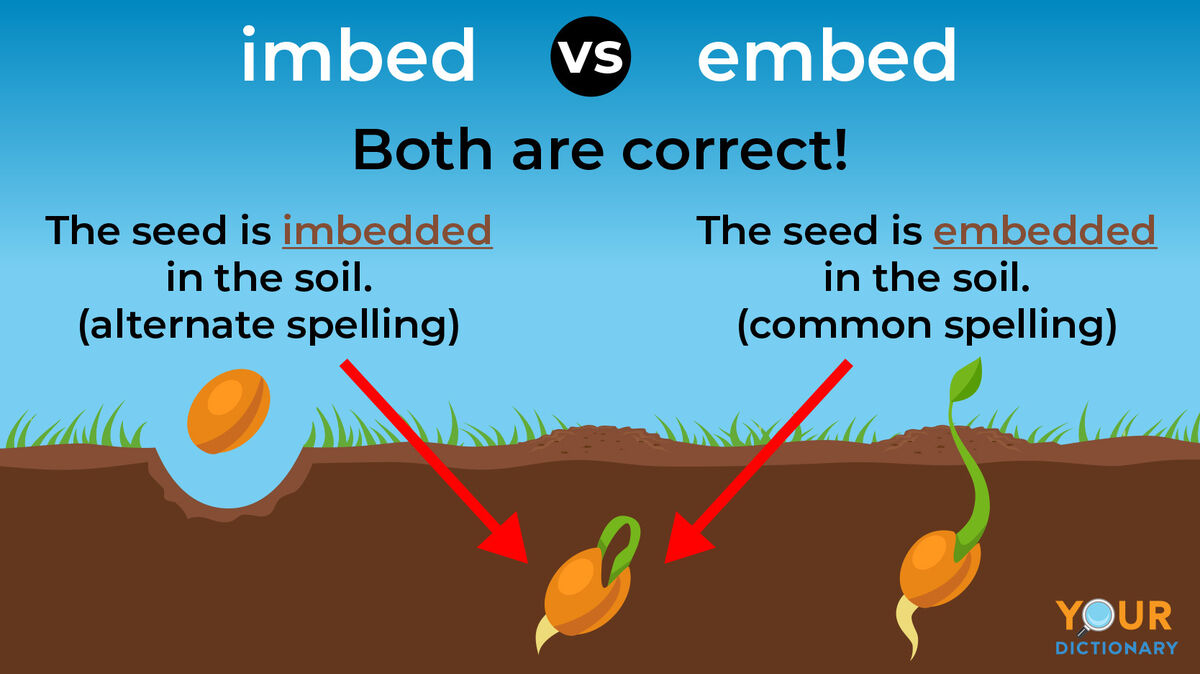
It can be hard to tell the difference between words that are spelled similarly or that sound the same (or nearly identical) when spoken. You may have seen both imbed and embed in writing. If so, you're probably wondering whether both versions are actually words and if there is a difference. Discover what you need to know to navigate imbed vs. embed in English language usage.
Imbed vs. Embed: Which to Use
Imbed and embed actually mean the same thing. They are just alternate spellings of the same word. It is correct to use either term and both words mean the exact same thing. However, embed is the most common spelling. If you want to make sure that no one questions your spelling or meaning, it's probably best to use the version of the word that begins with an "e."
What Do Embed and Imbed Mean?
Embed (im-ˈbed), which can also be spelled as imbed, is a verb. It has a few different meanings.
- to plant something deeply and firmly in the ground (embedding a seedling deep in the ground)
- to figuratively plant an idea in your head (to embed an idea in someone's mind by sharing it in a way that causes them to keep thinking about it)
- to insert a media file into a document (to embed an image within the body of a document created with a word processing application)
- to surround something entirely and closely (the pulp of stonefruit varieties closely embeds their seeds)
- to assign a specialized expert to provide training or advice to a group (to embed an organizational psychologist within a company or business unit)
- to assign a journalist to travel with an actively engaged military unit (to embed a journalist with a military unit that is seeking to capture an enemy of the state)
On rare occasions, the word embed (or imbed) might be used as a noun. For example, in the case of a journalist who is embedded with a military unit, members of the unit might refer to the journalist as "an embed" or "the embed."
Alternate Forms of Embed and Imbed
There are a few alternate forms for the words embed and imbed. Just as embed and imbed mean the same thing, this is also true for imbedded vs. embedded and other alternate forms of these words.
- embedded/imbedded - past tense
- embedding/imbedding - present participle
- embedment/imbedment - noun indicating the state of being embedded or the result of imbedding
Sentence Examples: Forms of Both Spellings
The terms embed vs. imbed, as well as alternate forms of both spellings, can be used interchangeably in sentences.
- When my father was a journalist, he was an embed during several active duty conflicts.
- The television network plans to embed a journalist with the deployed National Guard unit.
- Once you turn on the mixer, the batter will imbed the small pieces of fruit in the bowl.
- After Bob embedded the idea of taking a vacation in my mind, I couldn't think about anything else.
- The stake was imbedded so solidly in the ground that I could not remove it by myself.
- I am looking forward to embedding these vegetable seedlings in my garden.
- I am working on a crafting project that involves imbedding beads in candle wax.
- There is a deep embedment of limestone in this trench.
Clarity Is the Key to Avoid Confusion
Because clarity is such an important consideration for writing, it's advisable to use language that will clearly convey your meaning to readers. The more clear the message, the easier it will be for people to understand your intended meaning. Even though embed and imbed are both correct spellings that mean the same thing, it is best to choose the most common option. For that reason, it's generally better to use embed in your writing instead of imbed. However, either word would be correct.
While you're thinking about choosing between words that are similar, it's a great time to improve your language arts skills even more. Take the time to learn how to tell the difference between even more commonly confused words. Start with words like amoral and immoral.